We all know that quality links to our website are beneficial for rankings. But link-building is hard and time consuming and reckless link-building is sort of ‘illegal’ in terms of Google Guidelines. Your only ‘legal’ option is to create great content and distribute it properly in order to earn natural links.
The problem is that not all pages are easily linked to. It’s just not the case for category pages, or landing pages in strange niches, such as leech breeding. So, instead, you create other pages, with the specific target of getting links to them. If your website has no technical issues and the content is very good, some quality, natural links will surely get these pages rank well.
However, your ultimate target aren’t those pages, but your category and landing pages. Those are the pages you really want to get ranking. So… Does building links to one page help other pages rank well on Google?

We’re going to find out in this article. You’ll see some examples and some answers from Google itself. But, before that, I want to tell you why I decided to write this article.
- Pretext – How We Decided to Tackle This Subject
- Does Domain Performance/Authority Still Matter?
- Examples of Domain Performance Influencing Other Pages Rankings
- What Google Has to Say About Building Links to Deep Pages
- The Key to Ranking Pages High in Google Without Links
- Conclusion
1. Pretext – How We Decided to Tackle This Subject
There are actually two triggers that made us consider this subject:
The first one is a comment left by one of our readers on Facebook, on a post of a previous cognitiveSEO blog article. The article was about how to write quality content and build links in any niche, regardless of how uninteresting it is.
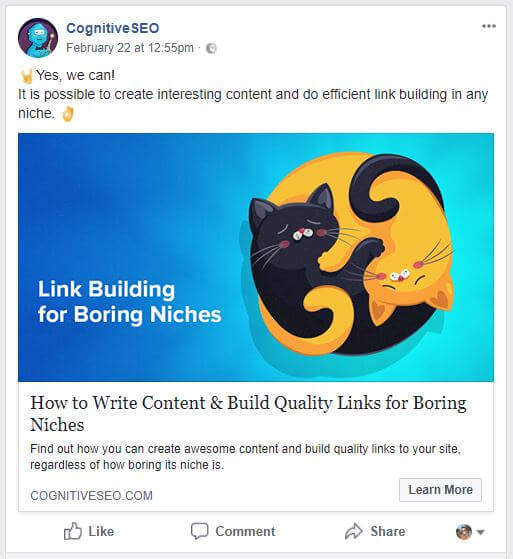
Here’s the user’s comment:
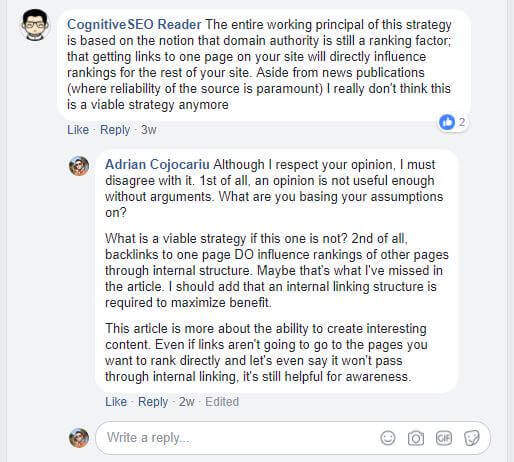
I wanted to give him a quick answer, so I started looking for it throughout our blog, then on the web and this got me to the second reason I decided to write this article. I couldn’t quite find anything about this. Most of the articles were around Domain Authority, but nobody specifically said anything about links to one page helping other pages on your website rank.
I don’t understand where his claim comes from. As you can see from my response, I’m not very fond on disagreeing with something without an argument, source or better alternative.
I was suggesting that method in the possibility that links to your commercial pages are not very easy to get. Instead of building links through black hat methods, you could write on a blog and properly promote the articles through social media and other marketing channels in order to acquire natural links. These articles will then pass the gathered link equity, through the domain, to the pages you actually want to rank. This is a white hat, cheaper alternative to automated link-building tools and paid guest posting or advertorials.
From what I know (and we probably all do), links, even if they are nofollow links, still help with rankings. We love links from other websites to our websites. It’s also great if the websites linking to us have backlinks of their own. The more, the better. It could be that they’ll have less of an impact the more Google’s algorithms evolve, but it’s not the case yet. So far, acquiring links has been proven countless times to help a website rank higher.
However, apparently, people think that links will only help the rankings of a page they actually point to.
So, will links to the root domain or other pages on the website help a particular page rank better in Google, or is our commenter right and Domain Performance/Authority is a deprecated metric? Let’s find out!
2. Does Domain Performance/Authority Still Matter?
The short answer is yes. But let’s put it like this:
If you were to start a new website, what would you prefer:
- A completely new domain, with no activity whatsoever, or
- An already established domain, with a lot of quality links?
I’m pretty sure you’d go for the second option. Why? Well, long story short, because of its authority. Because that domain is already seen well in Google’s eyes. Of course, it’s not that easy, as most used domains that are for sale are usually there for a reason: they probably have a ton of unnatural links and could even be penalized.
However, if you ever find an expired domain for sale, with a clean links profile, I’m sure you’ll go for it.
Checking the Wikipedia page for Domain Authority brings us this:
Domain authority can be described through four dimensions:
- prestige of a website and its authors
- quality of the information presented
- information and website centrality
- competitive situation around a subject
So there are other metrics involved, such as domain age and content quality. Domain age is a very relevant factor. We all know that new domains don’t do very well in the searches, regardless of the content they put up.
For example, even on my personal blog in Romania, SEOproject.ro, it took me around 5 months until I started seeing any results in the search engines, although I definitely wrote the best, most comprehensive content out there. I’ve only started writing in August, so before that, the blog had virtually 0 visits.

Screenshot from SEOproject.ro’s Analytics account
Some of the sites I’ve outranked have more age than my website and even more links. Here’s a domain age graph where you can clearly see who’s the baby.

Screenshot from Websiteseochecker’s Domain Age Tool
And they have a lot more links to their root domains:
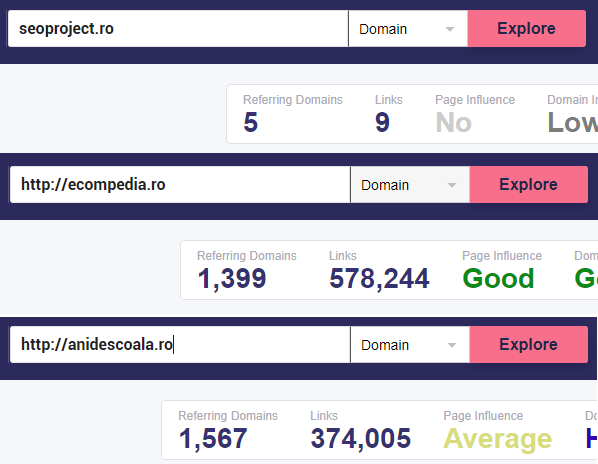
Screeshot from CognitiveSEO ‘s Site Explorer
Also, here’s proof of me outranking them with high quality content:
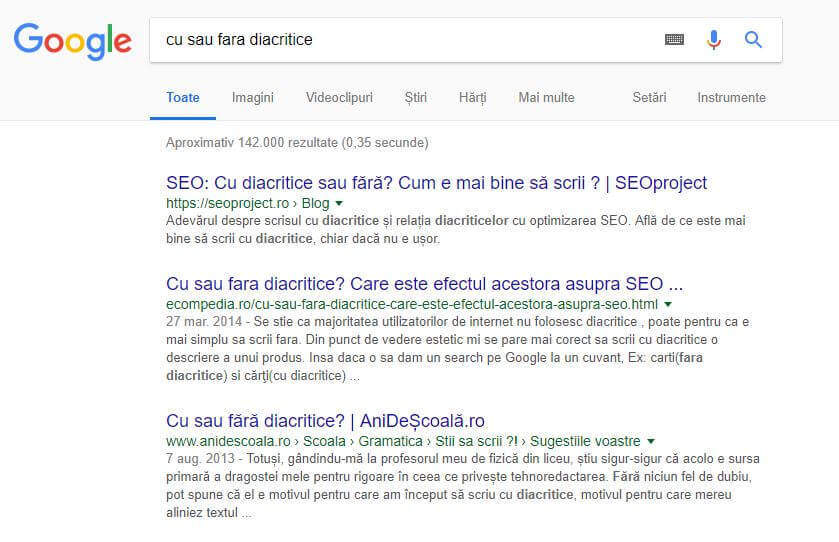
However, I do have the most links that point to a single page, but the difference in content length and quality here is too significant for one blog comment to matter that much.
But that’s the case for only a small amount of articles. On most occasions, other websites with more links and age are ranking their pages above mine, even if their content is not quite the best. The reason for that, is most probably due to the authority they’ve acquired over the time, through consistent content creation, promotion and link acquisition. Here’s an example:
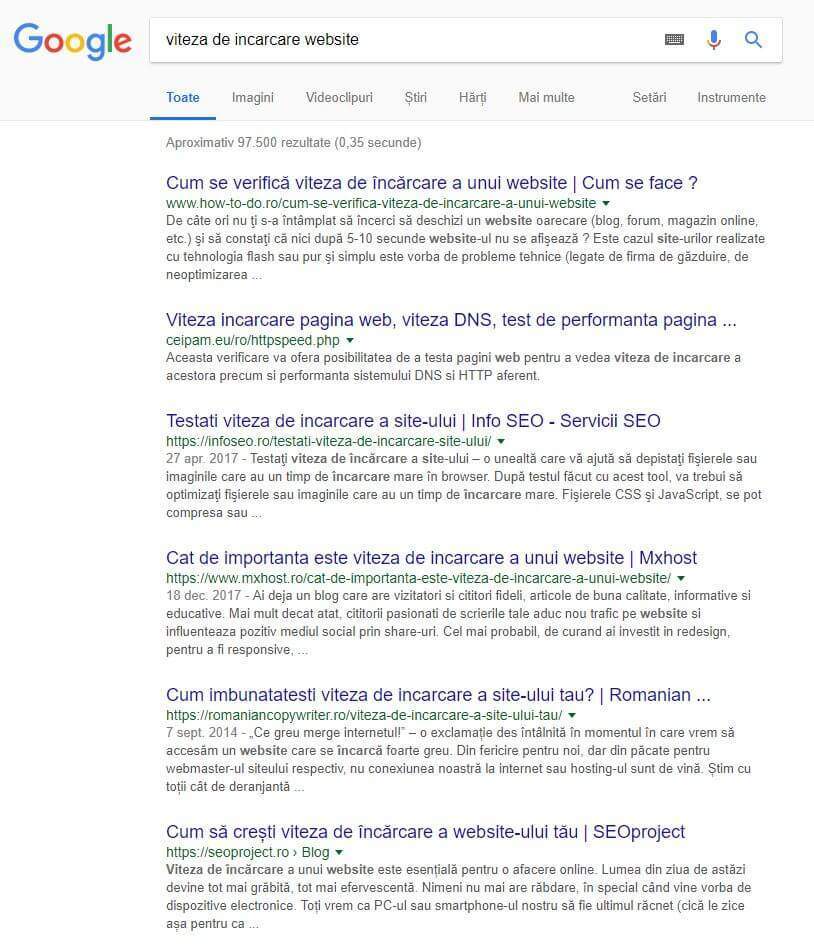
As you can see above, I’m ranked 6th in the results for this query. I did a check with Cognitive SEO’s Site Explorer on each separate page, and only one has 1 link, from an irrelevant foreign website. However, when I check the links pointing to the whole domains, we can see something else:
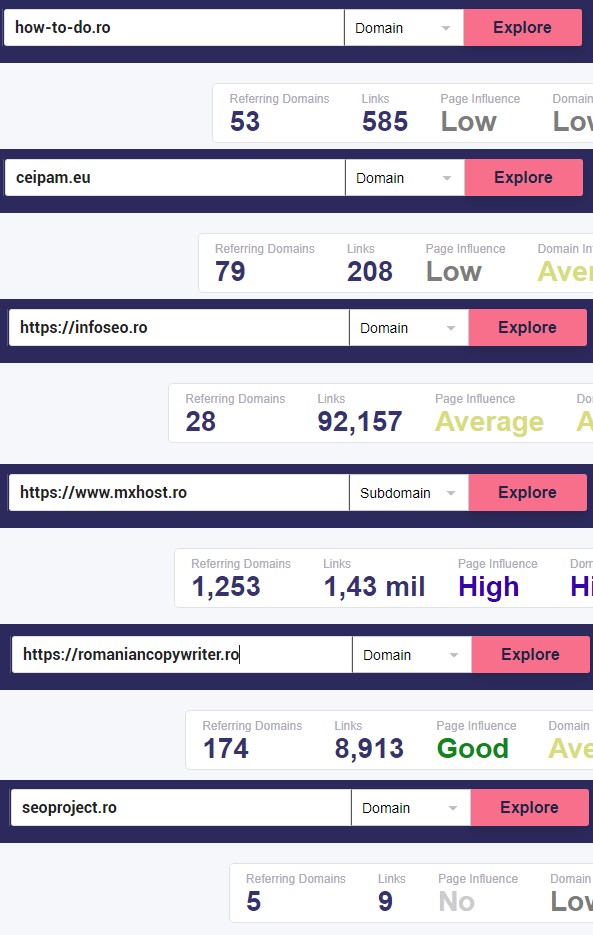
Screenshots from CognitiveSEO’s Site Explorer
Although it’s not in perfect order, you can clearly see the correlation. The website with the most referring domains doesn’t even answer the question properly. Still, my page is ranking pretty high for it’s competition and that is due to the quality of the content.
These websites don’t have links to the specific pages that are outranking mine. They have links all over the place, to different pages.
But wait, I have more proof.
3. Examples of Pages with Fewer Links, Ranking Better Due to Domain Performance
One quick note or disclaimer before I introduce these examples:
I’m not saying that you shouldn’t build links to a specific page. Obviously, it’s in that page’s best interest to acquire links of its own. This will help it rank better for its target keywords and will also help the entire domain grow in authority.
Cyrus Shepard himself stated this in one of Moz’s case studies regarding links’ influence on rankings:
| “The study did find numerous examples where individual pages ranked just fine without specific external links, as long as the website itself had external links pointing at it.” | |
 |
Cyrus Shepard |
| Ex Mozzer, current CEO of Fazilion Media\ / @cyrusshepard | |
I’ve just used the top 3 results in my examples, but the lower you go in the search results, the lower the number of total links pointing to the domains will be. What I’m trying to prove through these examples is that although some pages have links pointing specifically to them, other pages outrank them because the total number of links pointing to their root domain is significantly higher.
Here is an example that fits perfectly:
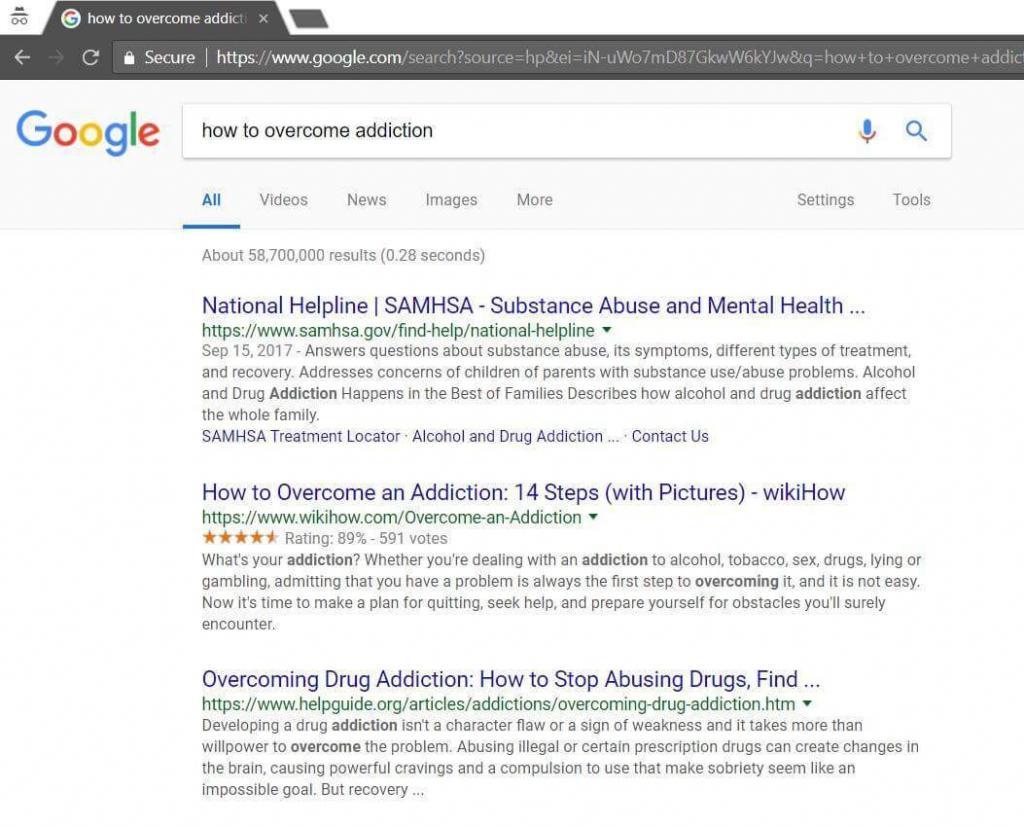
It’s yet another piece of proof that domain authority isn’t only about links. Domains with the .gov and .edu extensions aren’t as easy to get, as you need official paperwork to prove ownership of an educational or governmental institution. Google sees these as very authoritative domains, and tends to rank them pretty high.
First, let’s analyze the individual pages and look for their backlinks:
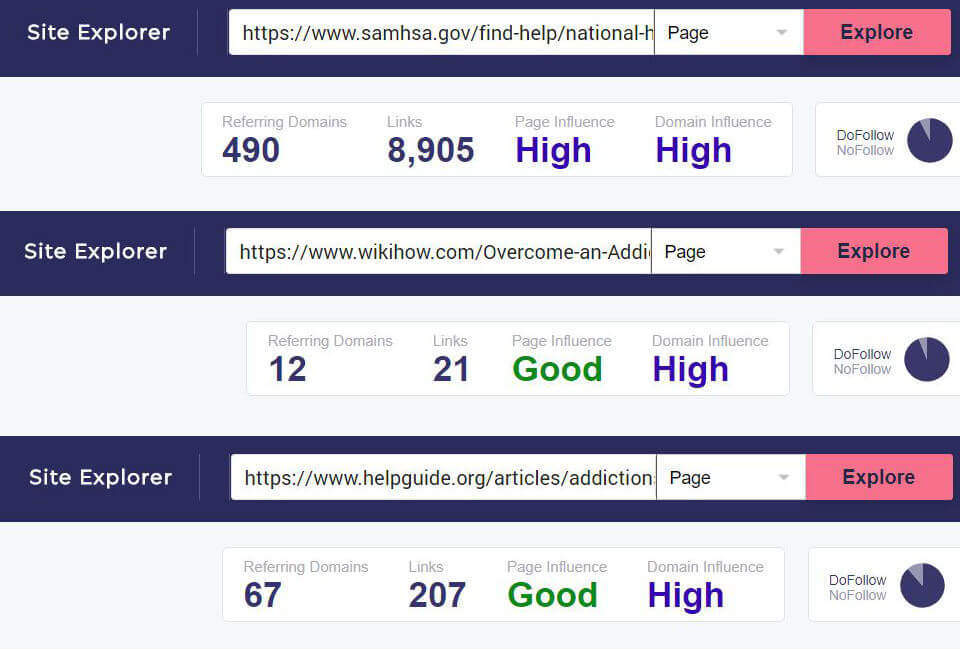
Screenshot from cognitiveSEO’s Site Explorer, analyzing link data.
You can clearly see that HelpGuide’s page, although it has over 200 links from 67 different domains, is outranked by WikiHow’s page, with only 21 links from 12 different domains.
Now let’s analyze the domains as a whole and see what we get:
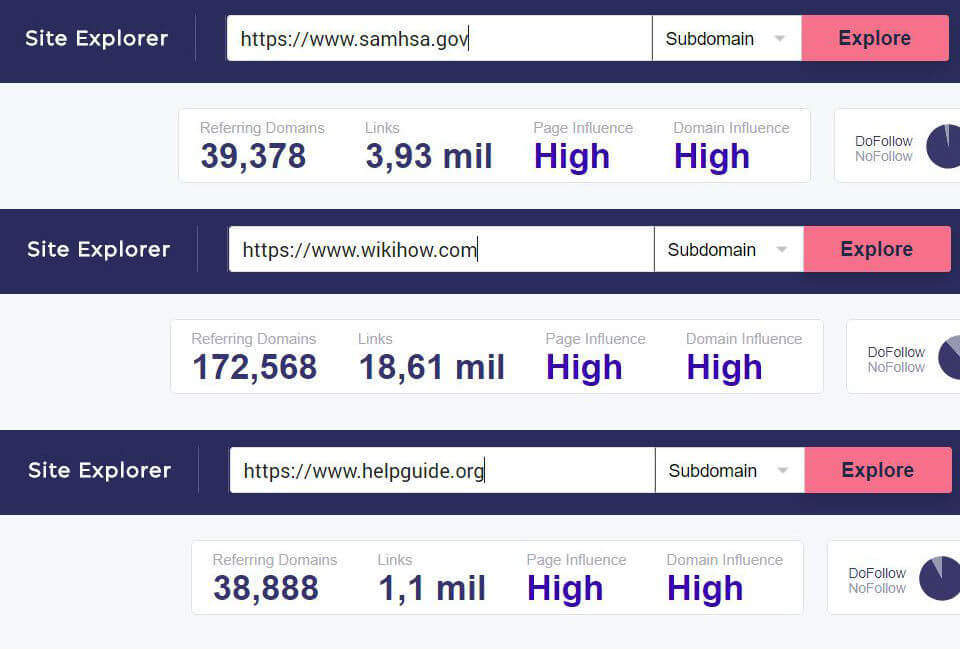
It seems like WikiHow has the highest amount of root domain links. WikiHow also has more than the .gov site. However, these searches were done with the settings tweaked to US – English, in Chrome’s Icognito mode. Doing a couple of searches for WikiHow and browsing their website a little before searching the keyword “how to overcome addiction” places WikiHow on the first position, which also proves that Google’s search is very personalized.
So could this be proof of other links to the root domain helping this specific page rank better? Maybe. But let’s check out another example:
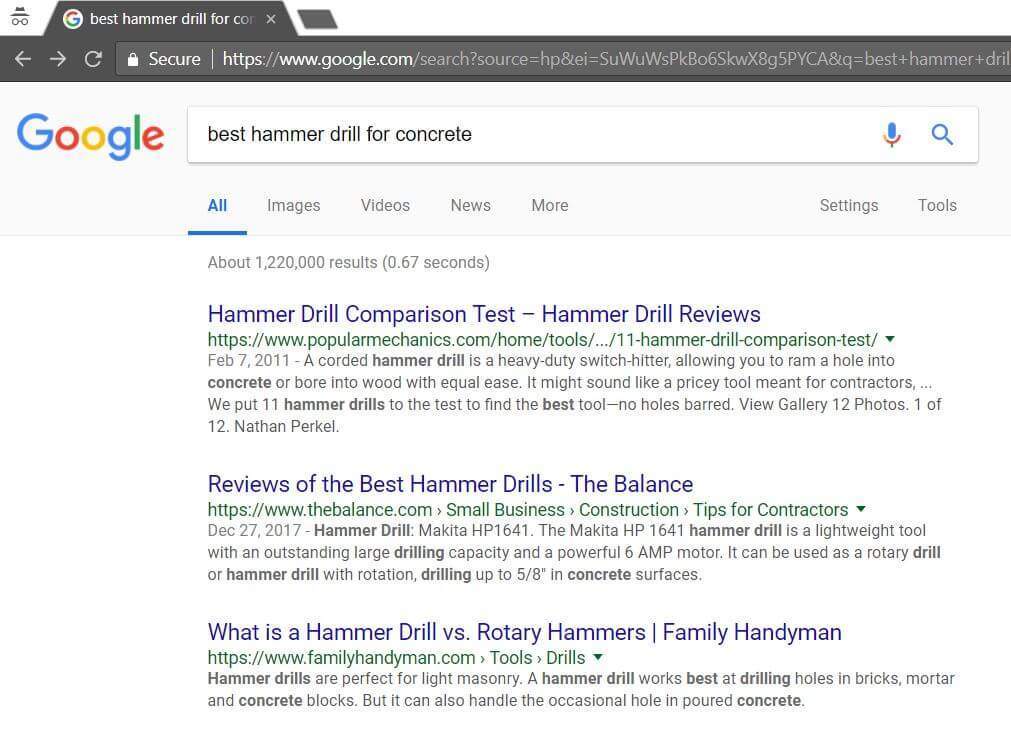
Here’s the individual pages analysis:
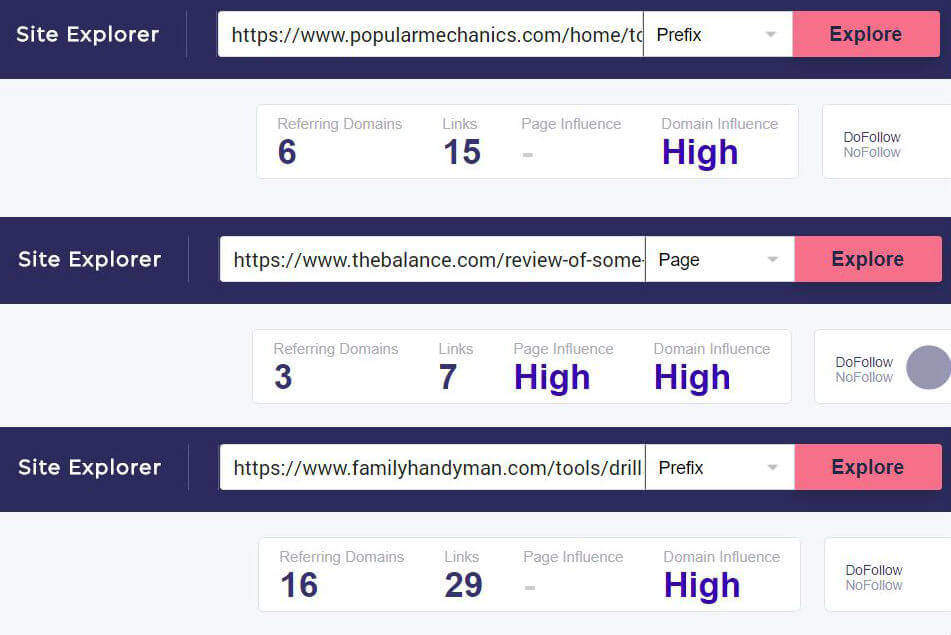
Again, the page with the highest amount of links ranks the lowest. Although FamilyHandyMan.com has more links to one specific page, it stands no chance against the authorities ahead of it:
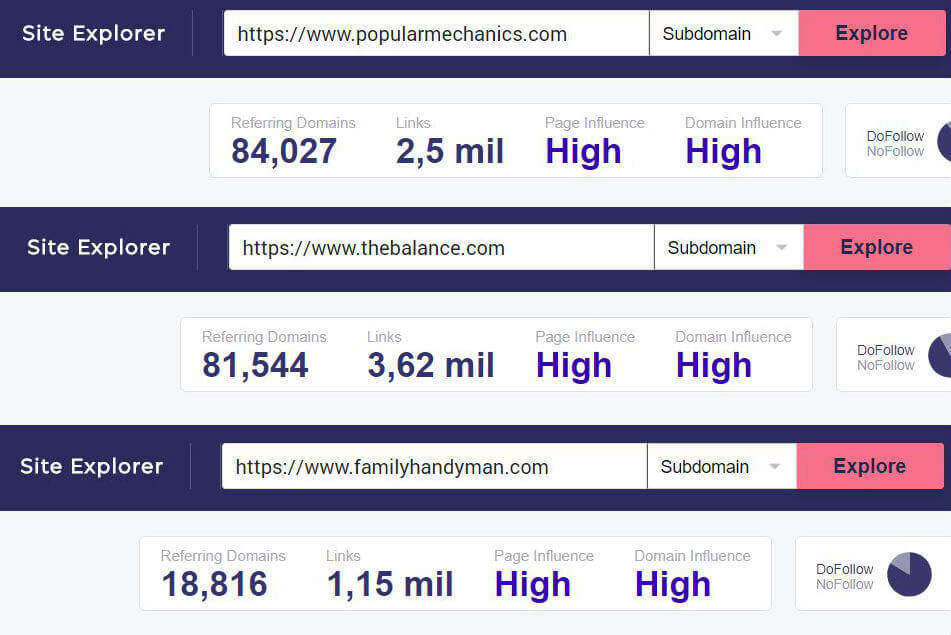
With over 4 times the amount of links from unique domains pointing to their root domain, these websites easily outrank the competition, even without as many links to the specific pages they’re trying to rank.
One final example will set things straight:
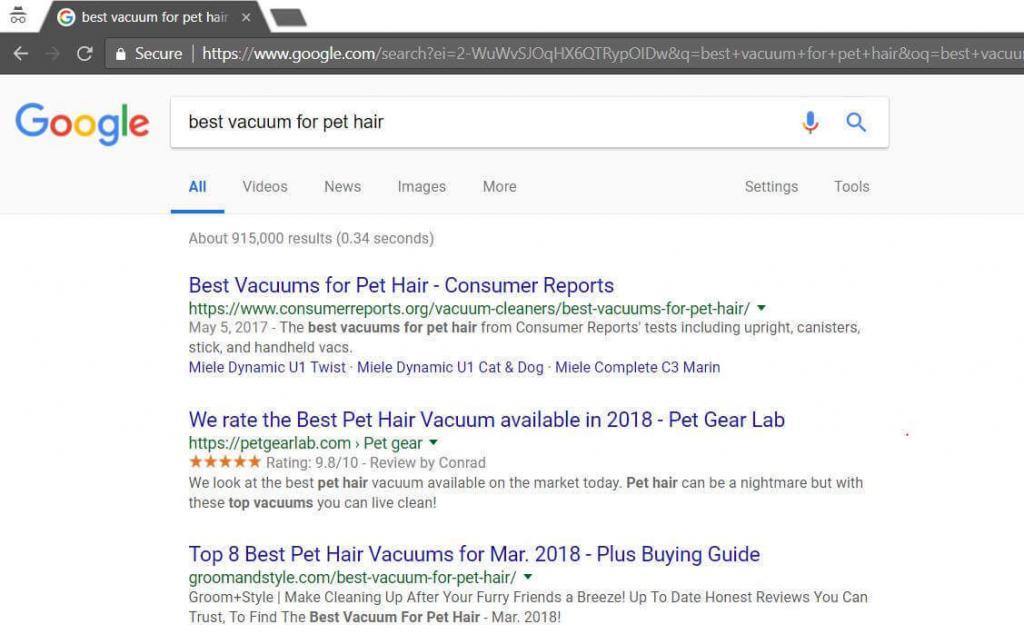
I’ve worked within this niche around 3-4 years ago, so I know very well that PetGearLab and GroomAndStyle weren’t around at that time. I also know that ConsumerReports wasn’t targeting this niche, but I knew that they will at some point.
This example is probably the clearest:
Of course, there are many cases out there in which websites with high authority and high number of root domain backlinks are outranked by non-authoritative websites with small amounts of links pointing to them. But we also have to take content quality into account.
Through these examples I just wanted to show that a correlation between referring domains and high rankings still exists, even if links to the page that’s ranking are missing.
But why need proof, when you have answers from Google itself?
4. What Google Has to Say About Building Links to Deep Pages
Asking a couple of experts here and there would have helped as well, but I decided to go directly to the source first : ask Google. Below you can see the conversation with John Mueller (Head of Spam @ Google) on this topic:
Maybe. But if B is totally irrelevant, it’s going to look a bit weird on your site & users aren’t going to convert.
— John ☆.o(≧▽≦)o.☆ (@JohnMu) March 12, 2018
Someone needs to program a cringe-reaction when Googlebot runs into “Top N X’s” and “N things you didn’t know about X”, but otherwise that seems like something worth trying out.
— John ☆.o(≧▽≦)o.☆ (@JohnMu) March 12, 2018
Now Google has never been very direct and definitive with their answers, but let me create a summary of the contents above:
|
Q: Can links to one page influence the rankings of another page on my website? A: Maybe. It seems like something worth trying out. |
|
 |
John Mueller |
| Head of Spam at Google / @JohnMu | |
So where’s that ‘maybe’ coming from? Well, there are other factors involved. For example, content quality or the quality of the backlinks. John can’t account for that, so he can’t simply say ‘Yes!’. If that was the case, John could be misleading newbies into thinking that chaotic link building might help them rank.
From what John’s saying, it appears that links are still useful and that links to one page CAN influence another page’s rankings. So, in case you can’t really get links to some pages you desire to rank with, links to other pages that can easily go viral and act as ‘link magnets’ can be very helpful.
If getting natural links to a commercial page that you want ranking isn’t easy, creating other relevant pages that act as link magnets can be helpful.
Also, this is definitely a first:
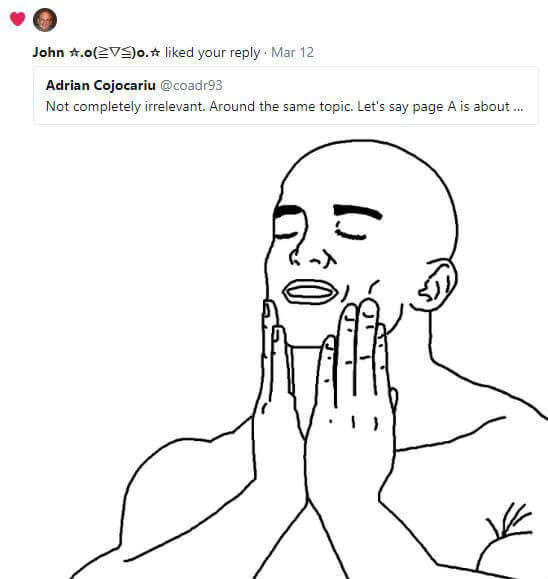
My reaction as an SEO when the Head of Spam @ Google likes my tweet.
However, there’s a catch to it. If you don’t do this right, links to one page will never help another page rank well.
5. The Key to Ranking Pages High in Google Without Links
No one can promise you that this will get you top rankings, but if nothing else worked, it’s definitely something worth trying.
First, you should have a blog set up, so you can create content that people will actually want to link to. Then, in general, there are 3 key points that you should follow:
1. The Content Should Be Top Notch
Without relevant, qualitative content, you won’t be ranking anywhere. This is actually up to the users. Google is just constantly testing to see if users are satisfied with the content. If they are, then Google will rank you higher. If they’re not, you will drop. It’s as simple as that.
Writing good content is very broad, but you can start by reading this article about how to write interesting content in any niche . You can also check out the SEO friendly blog post checklist.
You’ll also need quality content to be able to get natural links. Boring content never gets viral.
2. You Should Have Quality Root Domain Backlinks
As long as your backlink profile is complete trash, not only will you not get you pages anywhere, but you might also lose your chance of ever seeing high rankings if you get penalized.
Although people are saying that with the Penguin 4.0 bad links will just get ignored instead of resulting in penalties, many cognitiveSEO users that have reported massive organic traffic loss and ranking drops had one thing in common: a lot of unnatural links. I don’t know about you, but it sounds like a penalty to me.

Screenshot from the CognitiveSEO Tool showing a website’s highly unnatural link profile
Unnatural links are usually the result of a mix between manual link building patterns, spam, thin content and many other factors. These links can damage your rankings! The idea is to get natural links to different URLs around your domain, through proper and consistent content creation and distribution. That’s why having a blog on any website is such a good idea. This is especially the case for eCommerce websites, because the truth is they’ll hardly get any links if they stick only to category and product pages.
3. Your Internal Linking Should Be Well Set Up
This is the key part, so make sure you don’t miss it!
Remember when I said that pages can rank without links? I kind of lied. Pages still need links, but just not backlinks. They need internal links and the internal links structure should be very well set up in order to maximize results.
You see… external links and internal links are not very different. They’re still links. They still pass equity. If you link to your own page, you’re still passing on a vote, you’re recommending it.
Many authorities in the SEO field, such as Neil Patel, Search Engine Watch, etc. have stated that Internal Links help spread the authority throughout the website. A simple internal linking structure review can usually lead to higher rankings and increase in organic traffic.
Even if you don’t have internal links, every article/page still links to the homepage, which eventually links to every other page on your website. So getting links to any page on your site will pass some equity to all the pages on your website, unless you specifically tell them not to.
External links are more valuable and probably pass more equity. Internal links are kind of like scratching your own back. But it’s the kind of back scratching that sends some of the equity from one page to another. And that helps it go up in Google.
Whenever you publish something new that has the ability to go viral and get some backlinks, make sure you also link from it to other relevant pages you want to rank with. This also works vice-versa. When you post something new, go edit some old articles and link to the fresh content, whenever relevant. This will strengthen the ability of individual pages to rank and will also boost the crawlability and indexability of your website as a whole.
Also, use proper anchor texts when inter-linking. It’s good if you use keywords in it, but don’t overdo it. The main purpose of inter-linking is to keep the user engaged with the website and to provide relevant information for further documentation. Just try to keep it natural and useful.
Conclusion
Acquiring quality contextual links to one page can help another page rank higher, if you take into account some important factors, such as content quality and internal linking. If you’re having issues getting natural links to one page, make sure to improve its content and link to it from other relevant internal pages.
It’s even better if the internal pages linking to it had the opportunity to get some love from other websites. The equity will pass through your internal links and your website will be basically telling Google “This page is very important for me”.
The truth is that without any links at all pointing to your domain, it will be very hard for your website to rank its pages in the top 10 results. Proper distribution is mandatory for a domain’s growth over time. Make sure you always promote your content after you publish it. Take advantage of every marketing strategy you can think of, from social media to cold e-mail outreach. You can even make a distribution plan before you even write it.
I’m curious: what are your experiences with this? Do you have pages with low amounts of backlinks that rank well due to your domain’s authority? If yes, let us know about your experience in the comments section below.
The post Does Building Links to One Page Help Other Pages Rank Better in Google? appeared first on SEO Blog | cognitiveSEO Blog on SEO Tactics & Strategies.
Via Marketing http://www.rssmix.com/
No comments:
Post a Comment